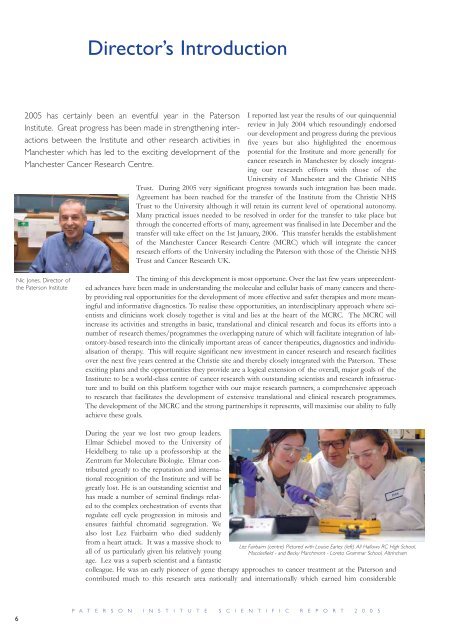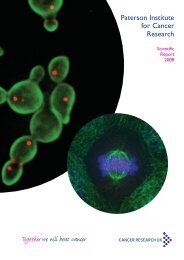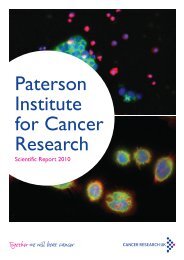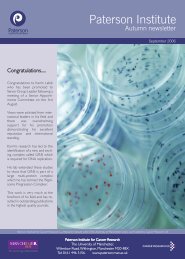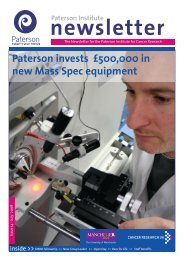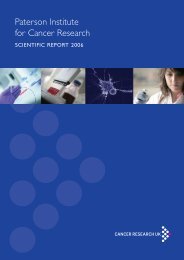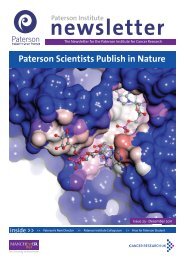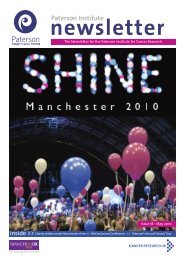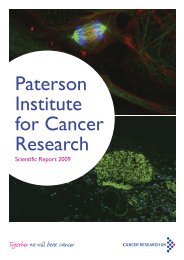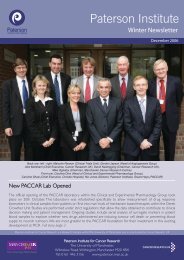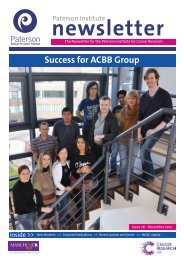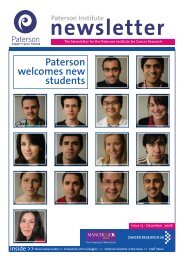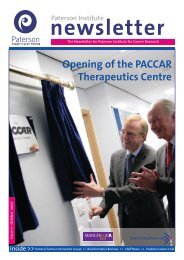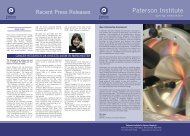Paterson Institute for Cancer Research SCIENTIFIC REPORT 2005
Paterson Institute for Cancer Research SCIENTIFIC REPORT 2005
Paterson Institute for Cancer Research SCIENTIFIC REPORT 2005
You also want an ePaper? Increase the reach of your titles
YUMPU automatically turns print PDFs into web optimized ePapers that Google loves.
6<br />
<strong>2005</strong> has certainly been an eventful year in the <strong>Paterson</strong> I reported last year the results of our quinquennial<br />
review in July 2004 which resoundingly endorsed<br />
<strong>Institute</strong>. Great progress has been made in strengthening inter-<br />
our development and progress during the previous<br />
actions between the <strong>Institute</strong> and other research activities in five years but also highlighted the enormous<br />
Manchester which has led to the exciting development of the potential <strong>for</strong> the <strong>Institute</strong> and more generally <strong>for</strong><br />
cancer research in Manchester by closely integrat-<br />
Manchester <strong>Cancer</strong> <strong>Research</strong> Centre.<br />
ing our research ef<strong>for</strong>ts with those of the<br />
University of Manchester and the Christie NHS<br />
Trust. During <strong>2005</strong> very significant progress towards such integration has been made.<br />
Agreement has been reached <strong>for</strong> the transfer of the <strong>Institute</strong> from the Christie NHS<br />
Trust to the University although it will retain its current level of operational autonomy.<br />
Many practical issues needed to be resolved in order <strong>for</strong> the transfer to take place but<br />
through the concerted ef<strong>for</strong>ts of many, agreement was finalised in late December and the<br />
transfer will take effect on the 1st January, 2006. This transfer heralds the establishment<br />
of the Manchester <strong>Cancer</strong> <strong>Research</strong> Centre (MCRC) which will integrate the cancer<br />
research ef<strong>for</strong>ts of the University including the <strong>Paterson</strong> with those of the Christie NHS<br />
Trust and <strong>Cancer</strong> <strong>Research</strong> UK.<br />
Nic Jones, Director of<br />
the <strong>Paterson</strong> <strong>Institute</strong><br />
Director’s Introduction<br />
The timing of this development is most opportune. Over the last few years unprecedented<br />
advances have been made in understanding the molecular and cellular basis of many cancers and thereby<br />
providing real opportunities <strong>for</strong> the development of more effective and safer therapies and more meaningful<br />
and in<strong>for</strong>mative diagnostics. To realise these opportunities, an interdisciplinary approach where scientists<br />
and clinicians work closely together is vital and lies at the heart of the MCRC. The MCRC will<br />
increase its activities and strengths in basic, translational and clinical research and focus its ef<strong>for</strong>ts into a<br />
number of research themes/programmes the overlapping nature of which will facilitate integration of laboratory-based<br />
research into the clinically important areas of cancer therapeutics, diagnostics and individualisation<br />
of therapy. This will require significant new investment in cancer research and research facilities<br />
over the next five years centred at the Christie site and thereby closely integrated with the <strong>Paterson</strong>. These<br />
exciting plans and the opportunities they provide are a logical extension of the overall, major goals of the<br />
<strong>Institute</strong>: to be a world-class centre of cancer research with outstanding scientists and research infrastructure<br />
and to build on this plat<strong>for</strong>m together with our major research partners, a comprehensive approach<br />
to research that facilitates the development of extensive translational and clinical research programmes.<br />
The development of the MCRC and the strong partnerships it represents, will maximise our ability to fully<br />
achieve these goals.<br />
During the year we lost two group leaders.<br />
Elmar Schiebel moved to the University of<br />
Heidelberg to take up a professorship at the<br />
Zentrum fur Moleculare Biologie. Elmar contributed<br />
greatly to the reputation and international<br />
recognition of the <strong>Institute</strong> and will be<br />
greatly lost. He is an outstanding scientist and<br />
has made a number of seminal findings related<br />
to the complex orchestration of events that<br />
regulate cell cycle progression in mitosis and<br />
ensures faithful chromatid segregration. We<br />
also lost Lez Fairbairn who died suddenly<br />
from a heart attack. It was a massive shock to<br />
all of us particularly given his relatively young<br />
age. Lez was a superb scientist and a fantastic<br />
colleague. He was an early pioneer of gene therapy approaches to cancer treatment at the <strong>Paterson</strong> and<br />
contributed much to this research area nationally and internationally which earned him considerable<br />
Lez Fairbairn (centre) Pictured with Louise Earley (left) All Hallows RC High School,<br />
Macclesfield - and Becky Marchmont - Loreto Grammar School, Altrincham<br />
P A T E R S O N I N S T I T U T E S C I E N T I F I C R E P O R T 2 0 0 5


